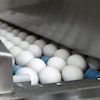
Research involving chicken feathers could result in a better filter for water decontamination, potentially offering a low-cost sustainable way to improve access to clean water globally.
“Feathers are a byproduct that do not necessary have a good application at the moment,”
Aman Ullah, Ph.D., professor, Faculty of Agricultural, Life and Environmental Sci - Ag, Food & Nutri Sci Dept, University of Alberta. “This application could add value to the poultry industry.
Feathers are a waste product of chicken processing and are typically converted into low-nutritional value animal feed or incinerated. With more than two billion pounds of feathers produced annually, this generates a lot of waste.
Finding a new use for the byproduct could help reduce the environmental impact of poultry processing, improving the sustainability outlook of the entire industry, in addition to increasing access to clean drinking water.
Improve keratins absorption properties
The project, published in the journal Chemosphere, developed a bio-based filter that improved the absorption abilities of keratin from chicken feathers.
Chicken feathers treated with the chemical agents graphene oxide and nanochitosan contain up to 99% of arsenic, cadmium, chromium, cobalt, lead, nickel, selenium and zinc -- eight of the most toxic heavy metals -- simultaneously.
The chemical agents were crucial in creating a treatment able to combat both organic and inorganic pollutants, explained Muhammad Zubair, who conducted the work to earn a Ph.D. in bioresource technology from the University of Alberta Faculty of Agricultural, Life & Environmental Sciences.
Groundwater contaminated with heavy metals, such as arsenic, impacts more than 137 million people in 70 countries and approximately 750 million people worldwide do not have access to clean drinking water, he estimated.
In addition to improving water filtration, the adsorbent technology could also be used in wastewater from oil and gas processing, as well as other chemical-related industries.



















